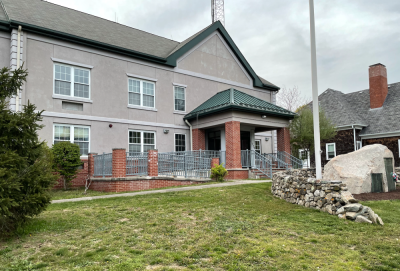Select Board, Historical Commission debate old police station’s slated demolition
After the Historical Commission voted to delay the demolition of the old police station in July, the project is stuck in limbo. To address the commission’s concerns and preservation goals, the Select Board brought them in for a special workshop and joint meeting Sept. 11, which turned into a debate about the building’s historic status and its viability and safety for reuse.
The Historical Commission wants to preserve the building, which it argues is a historic structure in Dartmouth, and reuse it, potentially for affordable housing or a community space. The main portion of the building, which was previously the Town Hall then the police station, was built in 1926. The commission argues that the building’s architecture and its historic use to the town qualify it for preservation.
However, the Town maintains that the building is not viable for reuse.
“The building has been left vacant for nearly ten years: we have been to two Town Meetings where we requested funding to demolish the building, [with] unanimous votes,” said Town Administrator Shawn MacInnes. “When we met with the reuse planning committee, they were pretty unanimous that there was no use for the building.”
MacInnes said the building’s longtime vacancy has further added to mold and air quality problems, in addition to an existing asbestos problem.
“The town has no use for it, no one’s ever approached the town for any use for it,” MacInnes said. “When they were advocating to build a new police station, there was a lot of historical discussion around the building — the town voted not to save the building.”
The town administrator said that the façade may look nice, but the rest of the building “is in not great shape.”
On the other hand, MacInnes said, the land itself could be beneficial for the town, and already ties in with existing recreation space. After the building is demolished, and before a new use is established, the lot would be left as unfenced green space.
Historical Commission member Sue Guiducci said the commission recently requested for an architect and a contractor of their choosing to accompany them into the building and evaluate its feasibility, but was denied access, a decision MacInnes said was made for their own safety.
Select Board member Shawn McDonald questioned whether an architect would be able to make an evaluation about the building’s air quality, but said the Historical Commission should be allowed inside to look at the building if they wish. To that end, he raised a motion to allow members of the commission and their architect into the building at their own risk, but asked that they wear a mask and submit a record of who entered the building. The motion passed unanimously.
“If you think that I can get black lung from spending 20 minutes inside the police station, I bet dollars to donuts that you’re wrong,” Guiducci said.
Select Board member Stanley Mickelson said the Town took it very seriously when legionella bacteria was found in the pipes in 2014 and an officer became sick with Legionnaires Disease. At the time, the Town was told that the building could not be reused, he said.
“Quite frankly, I wouldn’t bring my family into that building,” Mickelson said.
Guiducci argued that technology to address legionella bacteria has developed significantly in the past 10 years and could be more effective now.
Historical Commission member Bob Smith said he hopes the Town can come up with positive solutions during the commission’s delay period, which will last until January 2024.
The delay comes at a significant cost to the Town, MacInnes said, as it already accepted a contractor for demolition.
“If there’s a solution out there, fine,” McDonald said. “If the historical commission wants to go see if they can find something, have at it.”

















